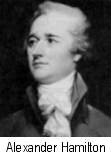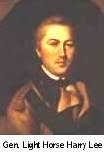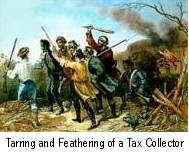

Disgraceful History
by Leon W. Kania
The Redcoats defeated our brave Minute Men at Bunker Hill only because we ran out of powder, or so they say. Actually, strong reinforcements and ample supplies of gunpowder were dispatched in plenty of time to reach the battle. Unfortunately, it was a hot summer's day, the troops ran low on water and somebody let them tap the rum kegs. Results: Visitors 1. Home team 0. I think these guys were called the "day or two men" afterward. The rum they drank was part of a thriving business using our beautiful clipper ships that traded African slaves for Caribbean molasses to make American whisky to buy more slaves. Only the bad guys traded it to the Indians.
We made and drank moonshine in incredible quantities. So great in fact, that it was a staple of our diet and a medium of exchange. European visitors commented that we drank whisky with all our meals by the mug. Somehow, we looked on it as nutritious and refreshing. With demand so high, farmers, particularly those in remote frontier regions, found that they could convert their crops of grain and fruit into whisky and brandy, thus getting an easily transportable value-added product. This practice almost caused the destruction of the United States of America and brought about the greatest crisis of George Washington's presidency.
The Whiskey Rebellion
The Whisky Rebellion of 1794 is a shameful episode in our history involving deplorable conduct of some of our most revered figures. Some historians say it was an attempt to overthrow our democracy and establish a police state ruled by a small elite with George Washington as king. It brought us to the brink of civil war.
 Alexander Hamilton, then Secretary of the Treasury, was a Federalist advocating a strong central government under a monarch. The states, especially the western frontier states, considered themselves self-governing members of a coalition. Hamilton believed a military confrontation was required to establish the supremacy of the federal government over the states. He also said that the confrontation should take place in western Pennsylvania because it was within easy striking range and also, it is thought because George Washington and his brother had vast land holdings there which they would want to protect.
Alexander Hamilton, then Secretary of the Treasury, was a Federalist advocating a strong central government under a monarch. The states, especially the western frontier states, considered themselves self-governing members of a coalition. Hamilton believed a military confrontation was required to establish the supremacy of the federal government over the states. He also said that the confrontation should take place in western Pennsylvania because it was within easy striking range and also, it is thought because George Washington and his brother had vast land holdings there which they would want to protect.
Hamilton crafted the excise tax of 1791 to incite resistance. The act mandated the registration of all stills, appointed tax collectors with powers of search and seizure and taxed all whisky at a flat rate of 7¢ per gallon at the still. The professed goal of the tax was to raise 21 million dollars for defense. At 7¢ per gallon, this equates to 300,000,000 gallons of whisky, which tells us a heck of a lot of people were making and selling moonshine.
Most frontier states collected no taxes. The law was so unpopular that no one would accept the position of tax collector. Pennsylvania was different however. First, there was long standing animosity between the Quaker dominated government in Philadelphia and the western counties. For decades the Quakers had refused military aid to the settlers, telling them to win the Indians over through love and kindness. At the same time Philadelphia merchants were sending pack trains laden with guns, ammunition and whisky to trade with the Indians. Second, Philadelphia sent in outsiders to enforce the tax and required legal actions such as trials and appeals to be held in Philadelphia, not local courts. Last, but not least, the tax was unfair. Whisky sold for 25¢ a gallon on the frontier, 50¢ in the more settled eastern regions. Thus, the struggling farmer on the frontier was taxed at 28% on his moonshine, whereas the bigger distilleries snug and safe in the eastern regions only paid 14%.

 Things went from bad to worse. At first, tax collectors were threatened, beaten and tarred and feathered. Then houses and barns were burned and skirmishes occurred with casualties on both sides. In August 1794, about 7,000 frontier militiamen marched on Pittsburgh, threatening to destroy the city unless the "obnoxious characters" were banished. George Washington, at Hamilton's urging, mobilized 13,000 troops from Pennsylvania, Virginia, Maryland and New Jersey under General "Light Horse Harry" Lee, Robert E. Lee's father. This number of troops was more than Washington usually had under his command during the Revolution. Things looked bad, some factions were all for seceding from the union and we were on the verge of civil war. We scared the hell out of ourselves.
Things went from bad to worse. At first, tax collectors were threatened, beaten and tarred and feathered. Then houses and barns were burned and skirmishes occurred with casualties on both sides. In August 1794, about 7,000 frontier militiamen marched on Pittsburgh, threatening to destroy the city unless the "obnoxious characters" were banished. George Washington, at Hamilton's urging, mobilized 13,000 troops from Pennsylvania, Virginia, Maryland and New Jersey under General "Light Horse Harry" Lee, Robert E. Lee's father. This number of troops was more than Washington usually had under his command during the Revolution. Things looked bad, some factions were all for seceding from the union and we were on the verge of civil war. We scared the hell out of ourselves.
Thankfully, Washington had the good sense to appoint commissioners to travel in advance of the army, to meet with rebel leaders to negotiate peace and offer amnesty. It took months. A few citizens were killed; more were arrested and carted off to Philadelphia for trial. Ultimately, all the prisoners were released, acquitted or pardoned and officially the federal government won. Unofficially, Washington's popularity sank so low that he did not seek a third term. When Thomas Jefferson succeeded him as president in 1802, one of the first things he did was repeal the hated excise tax. So, for the next 50 or 60 years we happily turned amber waves of grain into oceans of tax-free booze and became one nation united with a drinking problem. Drinking was so rampant in America that a strong temperance movement arose, prompted mainly by the churches, but endorsed by many, to include a young Illinois attorney named Abe Lincoln and old Light Horse Harry's son, Robert E. Lee.
 Soon however, we became two nations, disunited, but still with a drinking problem. When one officer was asked what his command needed, he answered, "Water for my horses, whisky for my men!" From officer's hip flasks, to the private's canteen, Yankee Doodle, or Johnnie Reb; we fought our Civil War drunk. Not all of us, of course, but enough that it was a serious morale and discipline problem. There were reports of officers trying to lead charges so drunk, they fell off their horses. Bound to inspire their men, eh? Worst, was the Battle of the Crater at Petersburg. An entire division was slaughtered in that attack while their general got plastered in a bunker to the rear. Then again, when a temperance group complained to Lincoln that General Ulysses Grant had a weakness for whisky, old Abe responded, "Find out what kind he drinks and I'll get a barrel for each of my generals!"
Soon however, we became two nations, disunited, but still with a drinking problem. When one officer was asked what his command needed, he answered, "Water for my horses, whisky for my men!" From officer's hip flasks, to the private's canteen, Yankee Doodle, or Johnnie Reb; we fought our Civil War drunk. Not all of us, of course, but enough that it was a serious morale and discipline problem. There were reports of officers trying to lead charges so drunk, they fell off their horses. Bound to inspire their men, eh? Worst, was the Battle of the Crater at Petersburg. An entire division was slaughtered in that attack while their general got plastered in a bunker to the rear. Then again, when a temperance group complained to Lincoln that General Ulysses Grant had a weakness for whisky, old Abe responded, "Find out what kind he drinks and I'll get a barrel for each of my generals!"
Early in the war, the Confederate government began confiscating stills, not to promote abstinence, but because they desperately needed the copper to make percussion caps for their muskets. Soon afterward, the U.S. government levied an excise tax on whisky again, not for the noble cause of temperance, but to finance the war. They soon followed with an income tax and somehow, forgot to repeal either after the war.